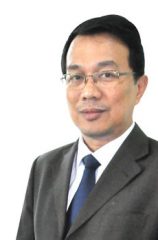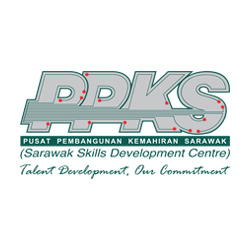In conversation with
Mr. Hallman Hj Sabri
Executive Director | Sarawak Skills Development Centre (Pusat Pembangunan Kemahiran Sarawak)

What is the meaning of education?
Mr. Hallman Sabri: Education is the most important thing in life. It can change the socioeconomic landscape of a country. It changes the mindset, behaviour, and outlook.
Personally, I feel it is education that changes people to move forward from poverty. Historically, it’s education that changed civilisation. If you resist education, you resist change. Survival of the community depends on education.
How would you identify PPKS’s role in line with Sarawak’s vision and ambition for future development?
Mr. Hallman Sabri: I’m part of the system that can help the state of Sarawak move forwards. PPKS is focusing on technical and vocational education. We’ve kept this focus since our formation 22 years ago. At this junction, as Sarawak is pursuing industrialisation and attracting a lot of interest from investors, we see that TVET, or technical vocational education and training, has a primary role in the development of the people of Sarawak.
Previous to this point there had been an emphasis on academic, theoretical education based on textbooks and classroom time. And before that, when I was young, the education system had a mixture of academic and vocational. That is important because some students are good academically and others are good at vocational, and it gives students exposure to education outside their preferences or strengths.
What are the main strategic goals that you have set in place since taking on your current role?
Mr. Hallman Sabri: Our big vision is to be a regional leader of innovation in TVET. We are well established in Sarawak- everyone knows PPKS- and we would like our good reputation to extend nationwide. PPKS was awarded with the prestigious Human Resource Development Award 2015 in Training Provider Category by the Human Resource Development Fund, an agency under the Malaysian Ministry of Human Resources.
Another great achievement for our group are the recognition from the Ministry of Education whereby, our subsidiaries, PPKS Private Vocational is consistently ranked one of the top private vocational colleges in Malaysia. The PPKS Private Vocational College currently offers Diploma in Power Generation with a total number of 150 students and we look forward to have another batch of 50 next year.
To date, PPKS has 11 learning centres and subsidiaries throughout the state of Sarawak including a new college in Sabah. Overall, we have around 3,300 students and every year we produced 1,000 graduates. Our graduate employment rate is around 80%, which is considered good, and students are assured a job within 6 months.
We are always looking to improve our teaching capacity and forge new links with industry. That is why we involve industry in our committees, including Research and Innovation and Training and Education, to make sure that the example problems given in our modules are relevant to real-life industry. I would identify this involvement of local industry as one of the real strengths of PPKS.
What is PPKS doing to promote collaboration with industry?
Mr. Hallman Sabri: One thing unique about PPKS is we are working collaborating with three parties: state government of Sarawak is helping us on infrastructure and operational budget; federal government is providing rooms and grants for students and equipment to some extent; industries sit on our board of directors where our policy is determined. We have 60 members representing all kinds of industry, keeping our curricula up to date and providing internship opportunities for our students.
What types of industry are you connecting with?
Mr. Hallman Sabri: The most popular programs that we run are on electronics, mechatronics, and mechanics, and we also run IT programs. These are the programs which we consider relevant to industry in Sarawak.
Mechatronics is the combination of mechanical and electronics. We have the capacity to generate the students for our electronics company. We are considering a new metallurgy program. We envision ourselves to be the top provider for that kind of training and metallurgical lab testing.
We have sent our instructors to undergo automotive, mechatronic, electronic, and electrical training in Germany through the Malaysian Meister Program. We hope that through this they will become experts in their areas.
What kind of services do you provide to create sustainable income for PPKS?
Mr. Hallman Sabri: Currently the economic environment is not in our favour. Management has been thinking that it is probably time for us to have a combination of technical programs and entrepreneurial skill programs. If our students find jobs in the future they could create jobs for themselves and for others. We’re hoping this can animate Sarawak to move forward.
How would you rate the skilled workforce and its entrepreneurial spirit here in Sarawak?
Mr. Hallman Sabri: There is a big gap between Sarawak and peninsular Malaysia. I think the industry that we have now is something that peninsular Malaysia has possessed for many years. You’ll notice the peninsula is moving away from heavy industry. I think we are pursuing it because our main advantage in Sarawak is our cheap electrical energy.
Sarawak has a very small population. For labour intensive work we need to get workers from outside the state. But that is not the reason why we cannot move forward. We have enough people who are well-versed in technical and vocational skills, they can computerise the job. So we are looking towards innovation.
How are you approaching the challenges of internationalisation?
Mr. Hallman Sabri: We are collaborating with TAFE in Australia, with one university in India, and early next year we are collaborating with a UK university on the metallurgy program I mentioned before. When it comes to internationalisation we have to benchmark. We have to learn from others, even if we have to bring in experts from outside.
The other side of internationalisation is attracting students from beyond our borders. We have a subsidiary company, i-CATS- International College of Advanced Technology Sarawak. The focus there is more academic. We are hoping to get more students from Indonesia and China to study there. Once we have the status of university college, we should be able to run more degree courses.
How do you encourage your students to think environmentally and act in a way that preserves nature while being entrepreneurial and creating growth for Sarawak?
Mr. Hallman Sabri: We are going to run a reforestation program somewhere in Miri. In a broader sense, our educational program is in line with the state government policy and direction. There is no way that we are going to harm the culture or environment of Sarawak, because we have to abide by the law.
Do you believe there’s a genuine understanding of the potential of ASEAN? What can it do for Sarawak and Malaysia in terms of higher education?
Mr. Hallman Sabri: I believe that ASEAN has to work harder to synergise. It is still loose. If they really want to look into synergising their effort, especially in terms of educational, they can. But I don’t see that happening yet. They have to work more closely together.
What are some of the proudest achievements from your time at PPKS?
Mr. Hallman Sabri: I’ve been here for six years, and one of my proudest moments was organising the World TVET Conference. So many people worked hard to make it a success. Even now people are emailing, wanting to know when the next event is. I told my management team that maybe we need to think on a national scale first. Perhaps after that we can go global again.
The challenges I’m facing in PPKS now are the economic downturn, which is a trigger for so many things. The budget is not as lavish as before, particularly for students. Those people who are doing TVET generally come from low-income families, and in the current climate families have difficulty sending their kids to study here.
Through the network that you have built over the years, are you able to offer scholarships for students?
Mr. Hallman Sabri: We formed a foundation and collected more than RM1 million. But foundations rely on the generosity of others, and can be difficult to sustain. We do have some support from the state government with which we can fund students.
How do you envision Sarawak and PPKS five years from now?
Mr. Hallman Sabri: I envision PPKS as the premiere TVET provider. I foresee our staff being highly skilled and motivated through the training we are giving them. I see the reputation of PPKS being such that we don’t have to do any marketing, word of mouth will attract students to our PPKS brand.
